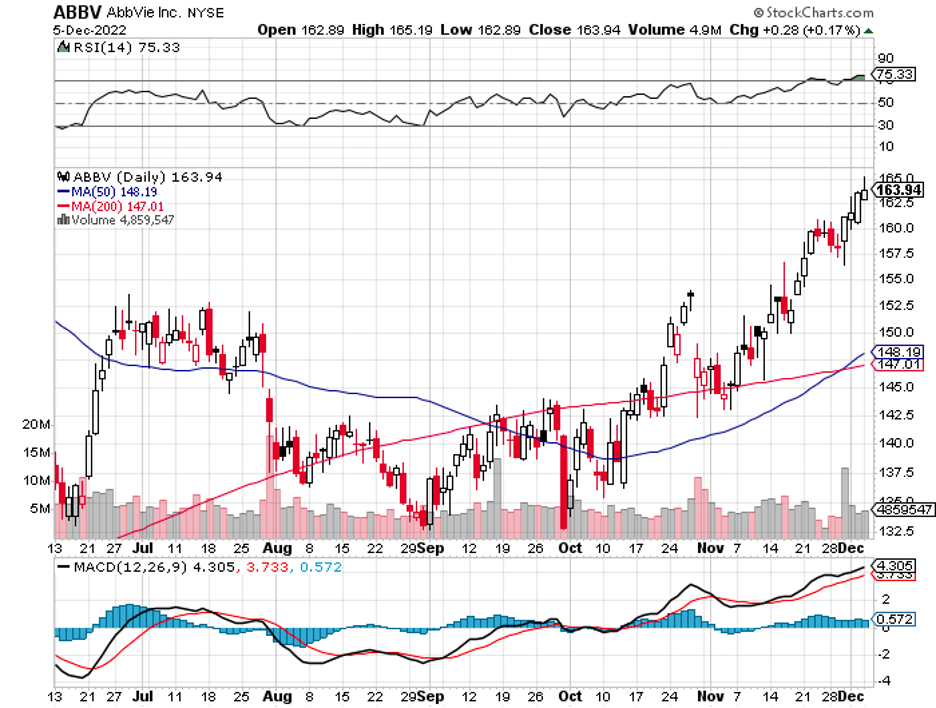A Discounted Misunderstood Stock
At times, a single stressful scenario triggers such wide-ranging panic among already anxious investors that it blocks out all the positive things occurring simultaneously.
This is what’s currently happening with AbbVie (ABBV), which is struggling to keep investors’ fears at bay as its mega-blockbuster Humira reaches patent expirations.
Humira is a treatment for various diseases such as rheumatoid arthritis, psoriatic arthritis, any losing spondylitis, and Crohn's disease. Since its approval and commercial launch in 2002, this immunosuppressive has managed to rake in a whopping $200 billion in sales.
For 2022, this drug is projected to account for 36%, or roughly $21.2 billion, of the company’s sales. Needless to say, it’s one of AbbVie’s top-selling treatments.
While AbbVie fought extremely hard to extend its patent protection, Humira has already lost exclusivity in Europe.
It is also gearing up to battle an increasing number of eager competitors in the form of biosimilars in the United States, which would all be allowed to market their versions of Humira by 2023.
AbbVie is more than just Humira, though. This giant biopharmaceutical company has actually developed treatments with the capacity to fill the anticipated revenue gap following Humira’s decline.
In fact, shareholders who opted to wait and hold until AbbVie reaches the transition point from Humira to the new products may have erred. After all, the company’s stock is up by over 19% thus far in 2022.
Besides that, AbbVie stock appears cheap and has an attractive dividend yield. Hence, it’s worth owning, especially in these challenging times.
To date, the company has been hard at work in developing its blood cancer or hematologic oncology program. This franchise is estimated to bring in $7.6 billion in sales by 2025, which is up from the $6.8 billion expected this year.
AbbVie is also experiencing increasing sales from two newly released drugs, Skyrizi and Rinvoq, which target psoriasis and arthritis, respectively. Both are estimated to account for $7.7 billion in the 2022 revenue of the company or 13% of the total.
Moreover, these treatments should be exclusively owned by AbbVie for a while. The company won’t be facing another patent loss on any essential product until 2029.
Looking at the trajectory of Skyrizi and Rinvoq, the two can become the next big stars and eventually offset the losses from Humira’s decline.
Not only those, but AbbVie also bought Allergan in 2020, building an ironclad plan to ensure it won’t sink after Humira’s patent expiration. The aesthetics franchise, which covers Botox, cool sculpting, and Juvederm, now contributes 10% to the total sales of the company.
This implies that AbbVie’s earnings, despite the Humira issue, are anticipated to hold up better than projected.
Moreover, AbbVie has a $22 billion free cash flow from 2021, while its dividend yield is currently at 3.7%.
These factors make AbbVie look even more lucrative as interest rates continue to hike and a potential recession is on its way.
At this point, it’s prudent to keep defensive stocks, particularly businesses without massive debt maturities, in the near future. In such a volatile market, AbbVie is one of the safest and most attractive stocks to invest in.
Overall, AbbVie is a well-positioned stock. Its tactical acquisitions, such as its aggressive move to buy Allergan, have all but guaranteed that it won’t be heavily relying on a drug with an expiring patent.
More importantly, this giant biopharmaceutical company developed potentially blockbuster successors of Humira in the form of Rinvoq and Skyrizi, ensuring that its future remains bright even without its decades-long top-selling product.
AbbVie has proven itself to be a solid stock and an excellent buy for long-term investors. It’s highly advisable to buy the dip.


